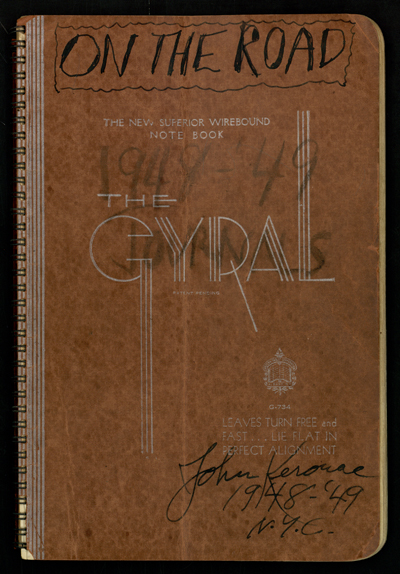Dog
by LAWRENCE FERLINGHETTI


The Harry Ransom Center has acquired the archive of American poet Peter Orlovsky (1933–2010), an important figure in the Beat Generation.
Orlovsky was the companion of fellow poet Allen Ginsberg for more than 40 years, and his papers reflect significant aspects of their relationship. Orlovsky’s collection comprises manuscripts, journals and notebooks, correspondence, tape recordings, photographs, and other personal documents, including unpublished poetry and prose works.
Around the time that Orlovsky met Ginsberg, he began to keep a journal, filling more than 140 notebooks before his death. Some of Orlovsky’s published poems appear in the journals, yet none of the journals have been published.
Correspondence in the collection highlights Orlovsky’s many connections with other poets, authors, and artists. There are more than 1,600 letters written to Orlovsky and/or Ginsberg, including 165 letters written by Ginsberg himself. Some notable correspondents include Gregory Corso, Lawrence Ferlinghetti, Ken Kesey, and Robert LaVigne. Orlovsky also wrote regularly to his parents and siblings, and more than 65 of his letters are included in the archive.
The collection features more than 2,650 photographs taken by or of Orlovsky, documenting the years between 1970 and 2010. Also included are eight reel-to-reel tapes from the 1960s and more than 120 audiocassettes made by Orlovsky during the 1970s and 1980s, some recording conversations with Ginsberg.
The Ransom Center has extensive collections of Beat Generation writers, including materials related to William S. Burroughs, Neal Cassady, Corso , Ginsberg, and Jack Kerouac.
The Orlovsky materials will be accessible once processed and cataloged.


The film On the Road, an adaptation of Jack Kerouac’s acclaimed novel of the same name, opens in theaters today. The Ransom Center holds a number of items related to the lives and works of the “Beat Generation” artists, including a journal Kerouac kept from 1948 to 1949 while preparing to write On the Road. In July 2010, a producer for the film contacted the Ransom Center with a request to help the actors access Beat culture and their characters’ personalities.
Kristen Stewart, best known for her role in the Twilight films, stars in On the Road as Marylou, a character based on Kerouac’s friend LuAnne Henderson. Kerouac once described Henderson as a “nymph with waist-length dirty blond hair,” but Stewart was eager to develop a more personal understanding of Henderson. Stewart, who said in an interview at the Toronto International Film Festival that On the Road has been her favorite book since she was 15, wanted to do Marylou justice.
To help with Stewart’s research, On the Road personnel requested a digitized copy of an interview with Henderson from the Ransom Center collections. Listening to Henderson offers a more personal understanding of her alter ego, Marylou, who remains something of an enigma. Stewart told CTV’s Canada AM, “[Marylou] is sort of, in the book, on the outskirts of things. You don’t know what’s going on inside her all the time.”
The interview was part of Barry Gifford and Lawrence Lee’s research for their oral biography of Kerouac, titled Jack’s Book and published in 1978. (Their research materials reside at the Ransom Center.) Gifford also served as a consultant on the film. In the interview, Henderson recalls her passionate but unpredictable relationship with Neal Cassady, whom she married at age 15. Cassady was the inspiration for the character Dean Moriarty in Kerouac’s novel, played in the film adaptation by Garrett Hedlund.
Despite opening the interview with a disclaimer that her “memory is really lousy,” Henderson’s stories are captivating. The episodes she recalls involve drama with Cassady’s ex-girlfriends, her experiences hitchhiking, and run-ins with the police. Henderson also reveals a more intimate and intellectual side to her relationship with Cassady. She remembers, “At night Neal would read me Shakespeare and Proust and whatever he was into.”
The Beats’ travels have acquired legendary status, which undoubtedly puts pressure on actors hoping to portray them convincingly and accurately. Fifty-five years after On the Road was published, archival materials offer the insight to help achieve precisely that.
Ransom Center Magazine is an online and print publication sharing stories and news about the Harry Ransom Center, its collections, and the creative community surrounding it.
Our monthly newsletter highlights news, exhibitions, and programs.
Copyright © 2024 Harry Ransom Center